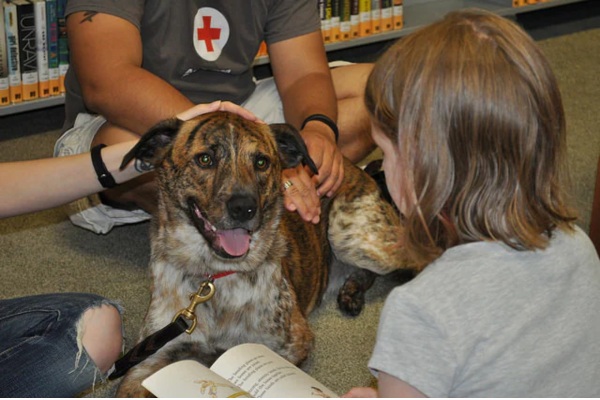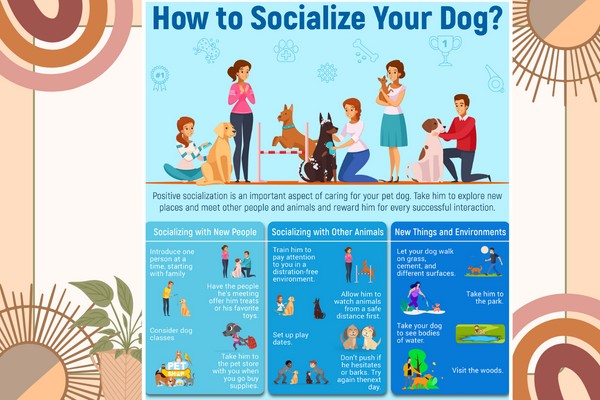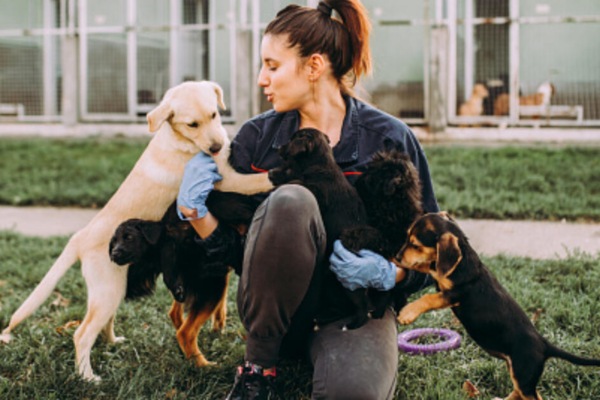Are you looking for a way to make a difference in the lives of rescued dogs?
Participating in reading programs for dog rescues is an excellent way to do just that. By participating, you can help these animals get used to new experiences and socialize with other people and animals.
You’ll also play an essential role in building relationships between volunteers and dogs and increasing the chances of finding them a forever home.
Read on to learn more about how you can get involved!
Benefits of Reading Programs in Dog Rescues
You can make a difference in the lives of these animals by participating in these initiatives! Reading programs in dog rescues are a great way to do just that.
With reading programs, volunteers can provide positive reinforcement and foster bonding between dogs and humans. This interaction helps socialize the dogs, making them better candidates for adoption into loving homes. The positive support given during reading sessions enormously impacts the well-being of dogs in rescue shelters.

Dogs become more confident and at ease with people when they receive consistent attention from volunteers who come to read stories to them. In addition, it provides a sense of comfort and security for them as they adjust to their new environment. Reading programs also allow potential adopters to find out which dog best suits their home.
The extra time spent getting familiar with each pup allows adopters to make an educated decision that will ultimately result in less heartache should something not work out as expected. By giving back through volunteerism, you can help improve the lives of homeless pets while providing meaningful experiences for yourself, too!
How to Get Involved
If you want to make a difference, get involved and see the impact first-hand!
Reading programs in dog rescues can be a great way to help animals and spread awareness. Participating in these programs is easy, and no special qualifications are necessary – just a passion for helping others.
Whether you read stories or poems with the dogs or implement techniques like positive reinforcement training, there are tailored strategies that suit any level of experience.
Start small by volunteering at your local rescue shelters. Speak with staff members about their available activities and what kind of time commitment is expected from volunteers.
Many shelters offer reading programs as an opportunity for rescued dogs to socialize and bond with people to increase their chances of adoption. Other possibilities include:
- Teaching basic obedience classes.
- Helping at adoption events.
- Providing foster care for young puppies until they find their forever homes.
Whatever role you decide on will make a massive difference in the lives of many animals who desperately need love and attention! Participating in reading programs is an enriching experience that will give you the satisfaction of knowing that your efforts are making a tangible impact on the lives of homeless pets everywhere.
Introducing Dogs to New Experiences and Socialization
By introducing dogs to new experiences and socialization, you can help them build confidence and trust in unfamiliar people and situations. Positive reinforcement-based methods are essential for creating a solid bond of trust between humans and dogs.

Here are four ways to get started:
- Encourage Exploration – Give your dog a chance to explore their surroundings with positive reinforcement when they discover something new or are interested in something unfamiliar. This will help them become more comfortable with sights, sounds, smells, and tactile sensations that could otherwise intimidate them.
- Introduce New People – Allow your dog to meet people from all walks of life, such as children or elderly adults who may be less familiar with animals. By gradually allowing them to experience different interactions with people they may not have met before, you’ll teach them how to interact appropriately in various scenarios.
- Socialize with Other Animals – Introducing your pup to other friendly dogs is an excellent way to learn appropriate behaviors around other animals while building up their self-confidence in social settings. However, you must supervise all interactions carefully to keep everyone safe and happy!
- Provide Comfort & Safety – Make sure your pup feels safe by providing plenty of reassurance during each step of the process – whether it’s a pat on the head or offering treats as rewards for overcoming their fears! With enough patience and love from their human companion, these activities will become an enjoyable part of your and your pup’s lives over time!
When introducing dogs to new experiences and socialization through positive reinforcement techniques, many beautiful things can happen: from newfound trust between pet parents and pups, more robust relationships between humans and animals alike, and even increased confidence among those previously timid canines! By getting involved in this program at any level (from volunteer work through fundraising), you’re helping provide a brighter future for rescue pups everywhere!
Building Relationships between Volunteers and Dogs
Nurturing the bond between volunteers and dogs is essential to enabling them to reach their full potential. The trust and understanding created through building relationships in dog rescue programs are paramount for progress. Engaging volunteers in activities that foster trust, such as walking, playing games, providing comfort during storms or loud noises, and teaching basic commands, helps create a strong connection between canine and humans.

Action Connection Bond
- Walking Understanding Trustful Relationship
- Playing Games Fun & Comforting Environment Ownership & Respectful Interactions
- Comforting During Storms/Noise Companionship & Safety Loyalty & Emotional Support
Volunteers should be encouraged to find what works best with each pup. Whether it’s long walks or short play sessions, these activities should be tailored to fit the dog’s needs while still finding ways to build relationships within the rescue environment. In addition to physical activities, spending quality time talking and snuggling with dogs can help both parties feel more at home when volunteering together. These simple yet powerful actions will help build confidence in both volunteers and dogs.
Fostering a trusting relationship between humans and canines takes patience and dedication but is invaluable for helping dogs find forever homes. With love, care, and respect from volunteers—dogs can learn to feel safe again while developing lasting bonds that will carry over into new homes where they’ll continue their journey toward a loving life.
Increasing the Chances of Finding a Forever Home
Creating lasting connections between volunteers and dogs can help increase the chances of finding a forever home, ultimately leading to brighter futures for these four-legged friends. Reading programs in dog rescues are an excellent way to achieve this connection:
- Training basics such as sit, stay, and come when called will help the volunteer and dog feel more comfortable in each other’s presence.
- Providing safe handling during reading sessions shows the dog it is valued and loved, encouraging trust between them.
- Allowing volunteers to interact with multiple dogs will give them a better understanding of their needs and preferences so they can find the perfect match for their future forever home.
Reading programs are beneficial for helping build relationships between volunteers and dogs and provide opportunities for physical exercise, mental stimulation, socialization skills, and problem-solving activities – all critical components of successful adoptions!
Learning to read body language is critical in developing strong bonds with pups, which helps ensure they’ll be placed in homes where they can thrive for years. With patience, dedication, and guidance from rescue staff members or trainers, every pup has a chance at finding their new best friend!
See Also:
- Your Guide to Dog Adoption in Los Angeles
- Dog Adoption Baton Rouge
- Miami-Dade Animal Services Pet Adoption and Protection Center
- Xoloitzcuintli Adoption
Conclusion
You’ve heard the stories and seen the pictures, and now you know how essential reading programs in dog rescues are.
They help dogs adjust to their new environment and provide volunteers with a unique experience that allows them to form relationships with these animals.
Plus, 83% of rescue dogs participating in reading programs get adopted into forever homes!
So, if you’re looking for a way to make a difference in your community and give back to animals in need, look no further than starting a reading program at your local dog rescue.
With just a little bit of effort, you can truly make an impact on the lives of many lovable pups.
If you can’t find the right dog for you to adopt locally, please consider adopting a dog from Bone Voyage Dog Rescue. We’ll fly with your dog to you.
Frequently Asked Questions
What qualifications do I need to be a volunteer?
You don’t need to be a professional to make a difference in the lives of dogs! As the adage goes, “many hands make light work,” and becoming a volunteer in dog rescue is no exception.
To become a volunteer, you must be passionate about engaging in activities and setting expectations for yourself and others. You must also subconsciously desire to serve others by giving your time and energy.
Volunteering at dog rescues can be an enriching experience that will bring joy to you and the animals!
What age group of dogs do reading programs typically work best with?
You can make a big difference in the lives of dogs by socializing and teaching obedience through reading programs.
These programs are most effective with puppies and young adult dogs since they’re still learning to interact with humans.
With your help, you can teach them basic obedience commands and how to be comfortable around people.
Socializing these dogs will make them more adoptable and ultimately give them a chance at finding loving forever homes.
How can I tell if a dog is comfortable with the reading program?
Look for signs of positive reinforcement when trying to tell if a dog is comfortable with a reading program. Is the pup relaxed and wagging its tail? Does it show interest in interacting with the reader?
To ensure the pup feels good about the program, use socialization techniques such as praising your dog when interacting with a book. This helps create a safe and enjoyable atmosphere for you and your furry friend.
Ultimately, these small steps will help your puppy feel secure in their environment and foster an excellent relationship between you two. After all, investing some quality time together is what makes being part of a reading program so rewarding.
What safety measures are in place for volunteers and dogs?
You care about the safety of both volunteers and dogs regarding animal rescue programs. That’s why it’s essential to understand the safety measures for these activities.
Dogs need socialization to adjust to being fostered or adopted into a permanent home. Foster homes provide temporary shelter and socialization opportunities for dogs until they are ready for adoption.
All volunteers must be thoroughly screened before working with the animals, and all interactions should occur under close supervision to ensure the health and safety of everyone involved.
How much time is typically required of volunteers?
Are you considering volunteering your time to help make a difference in the lives of shelter dogs? You may be wondering how much of your time is required.
The truth is, it doesn’t take as much as you think! While the amount of time can vary depending on the particular program and the needs of each dog, many programs require volunteers to spend just a few hours each week – or even less – providing positive reinforcement and bonding with the animals.
This is an enriching experience that has a lasting impact on both humans and dogs alike!
